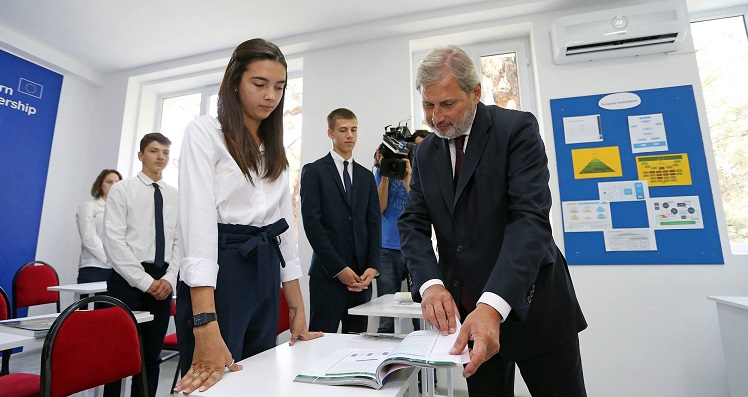The Eastern Partnership European School:
New perspectives for youth in the EaP region

Johannes Hahn in the classroom with the students of Eastern Partnership European School in Tbilisi. Photo: PM Bakhtadze's press office

This week families prepare for the new school year. Bright, motivated students across Europe are full of determination to acquire new skills to support their employability in the future. Today’s students will be tomorrow’s citizens, leaders, professionals and entrepreneurs. Providing them with a good education and the right skills is an investment in the future.
At the start of this school year, I am proud to inaugurate, together with Georgia’s Prime Minister Mamuka Bakhtadze, the brand new Eastern Partnership European School. It is a major achievement for the European Union and documents its support to young people across the Eastern Partnership region (Armenia, Azerbaijan, Belarus, Georgia, the Republic of Moldova, and Ukraine).
The school will open its doors today in Tbilisi to its first 30 students aged 16-17 who succeeded a rigorous, merit-based selection process to obtain the scholarships. With the support of the European Union’s 28 Member States and its six Eastern partner countries, the students will be offered a high quality education with the opportunity to engage in the study of Europe, in a multilingual, multicultural environment, through academic courses and extra-curricular activities.

Johannes Hahn at the opening ceremony of the Eastern Partnership European School in Tbilisi. Photo: PM Bakhtadze's press office
Investing in young people is my priority. In my role as European Commissioner, I have actively worked together with the six partner countries to bring more opportunities to young people across the region. I believe everyone has the right to quality and inclusive education.
The Eastern Partnership Summit in November 2017 endorsed a new support package for youth, worth €340 million, as one of the "20 Deliverables for 2020". This will help create the necessary conditions for young people from the entire region to study, work, engage with their societies and to fully develop their potential.
As part of this package, the European Union will reinforce one of its most successful initiatives, Erasmus+. By 2020, we estimate that over 80,000 young people, youth workers, students and academic staff from the Eastern Partnership region will have taken part in exchange opportunities.
I have always regarded education as the most important driver of change. However, changes in technology and labour market patterns all require constant adjustments.
Young people increasingly need to develop skills and approaches that can make them more flexible and innovative to deal with a constantly evolving environment. Basic and transversal skills taught from pre-primary up to secondary and tertiary education are crucial.
We also know from experience that a better matching of skills with labour market demand is key to enhance competitiveness and economic development in the long term. Therefore, continued support is being provided to Vocational Education and Training (VET) across the six countries. A budget of over €80 million will aim at modernising qualification systems and VET attractiveness.
The EU also strongly shares the six countries’ aspirations to support the development of entrepreneurial skills and bring its education system to the next level. In this context, the EU4Youth programme aims to improve youth employment perspectives – notably, but not only for vulnerable and disadvantaged young people - by fostering their entrepreneurial potential and helping them develop indispensable skills for the labour market.
This is done through the establishment of business incubators and innovation clusters, mentoring schemes focused on entrepreneurship and non-formal catch-up programmes for early school leavers.
Supporting young people has always been and will continue to be at the heart of the agenda of the European Union. The Eastern Partnership European School focuses precisely on the goal: to provide young people with the right set of knowledge, skills and opportunities based on European values. I am convinced that this will contribute to a better exchange and understanding in the region.
 Tweet
Tweet  Share
Share